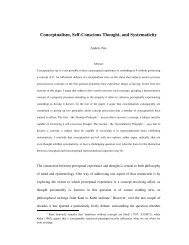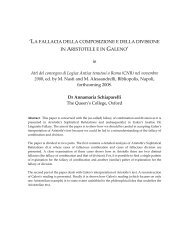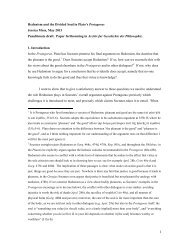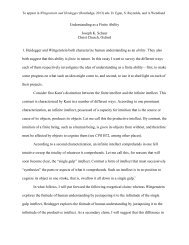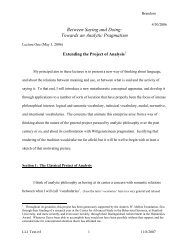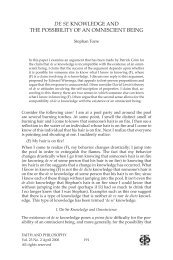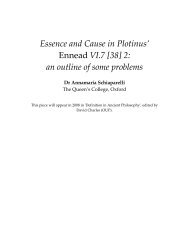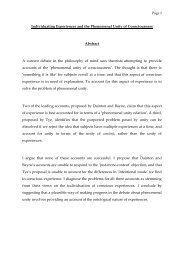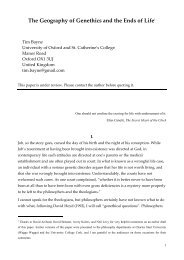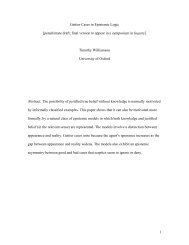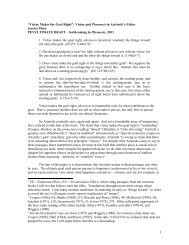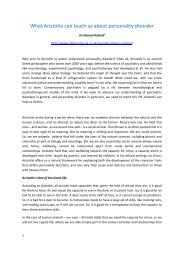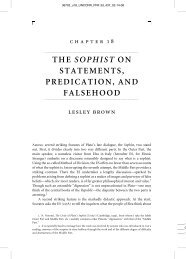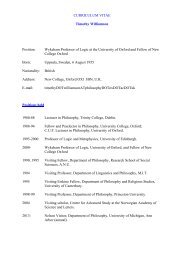Say who everyone is as you go along - Faculty of Philosophy ...
Say who everyone is as you go along - Faculty of Philosophy ...
Say who everyone is as you go along - Faculty of Philosophy ...
You also want an ePaper? Increase the reach of your titles
YUMPU automatically turns print PDFs into web optimized ePapers that Google loves.
30<br />
It <strong>is</strong> entailed by Zen that suffering <strong>is</strong> not necessary. Suffering can be cured by<br />
Zen, so there <strong>is</strong> no need to endure it. Nietzsche h<strong>as</strong> the thought that at le<strong>as</strong>t some<br />
suffering <strong>is</strong> unnecessary, suffering prem<strong>is</strong>ed on metaphysical or theological belief:<br />
'To suffer for the sake <strong>of</strong> morality and then to be told that th<strong>is</strong> kind <strong>of</strong> suffering <strong>is</strong><br />
founded on an error: th<strong>is</strong> arouses indignation. (DD para 32 p. 24)<br />
We can suffer not merely because we do what we think <strong>is</strong> right and then find out it<br />
w<strong>as</strong> wrong. We can d<strong>is</strong>cover that the d<strong>is</strong>tinction between right and wrong that we<br />
were <strong>as</strong>suming in our guilt or mortification <strong>is</strong> false and only h<strong>is</strong>torically inherited. In<br />
either c<strong>as</strong>e we now view our suffering <strong>as</strong> pointless. One can imagine c<strong>as</strong>es where<br />
people fight in a war because they think their side <strong>is</strong> right. It later turns out that their<br />
erstwhile opponents had a much stronger moral c<strong>as</strong>e than their own side's<br />
propaganda allowed. The veterans now regard their suffering <strong>as</strong> pointless.<br />
Despite their avowedly anti-metaphysical stance, Nietzsche and the Zen Buddh<strong>is</strong>ts<br />
allow that there <strong>is</strong> a d<strong>is</strong>closure <strong>of</strong> reality. It <strong>is</strong> through suffering:<br />
'For there <strong>is</strong> a unique consolation in affirming through one's suffering a "pr<strong>of</strong>ounder<br />
world <strong>of</strong> truth" than any other world <strong>is</strong>' (DD para 32 p.24)<br />
Nietzsche <strong>is</strong> not identifying the deeper world <strong>of</strong> truth with suffering. That would be<br />
at odds with h<strong>is</strong> repudiation <strong>of</strong> Schopenhaurian pessim<strong>is</strong>m. Rather, the route to the<br />
deeper world <strong>of</strong> truth <strong>is</strong> through suffering. The transfiguration <strong>of</strong> the human <strong>is</strong><br />
enacted in suffering. It would be the antithes<strong>is</strong> <strong>of</strong> Buddh<strong>is</strong>m to d<strong>is</strong>cover the truth to<br />
be the suffering (even though it <strong>is</strong> pr<strong>of</strong>oundly true that there <strong>is</strong> suffering). In Zen, the<br />
route to truth <strong>is</strong> through suffering, by the overcoming <strong>of</strong> suffering: by becoming the<br />
kind <strong>of</strong> being <strong>who</strong> no longer suffers.<br />
In Nietzsche and Zen, the escape from suffering <strong>is</strong> difficult to achieve. We are<br />
ironically attached to suffering. Nietzsche says<br />
'one would much rather suffer and thereby feel oneself exalted above reality [...]<br />
than be without suffering' (DD para 32 p. 24)<br />
Similarly, many would prefer their ordinary life <strong>of</strong> duhkha to the severe training <strong>of</strong><br />
the Zen monk, even though the latter prom<strong>is</strong>es an escape from suffering. Our<br />
ordinary habits <strong>of</strong> valuing and the desires they sustain cause suffering. As Nietzsche<br />
puts it<br />
'Men have become suffering creatures in consequence <strong>of</strong> their morals' (DD 30)<br />
In Buddh<strong>is</strong>m, pride <strong>is</strong> a form <strong>of</strong> attachment to the origin <strong>of</strong> suffering. Nietzsche<br />
thinks pride keeps us impr<strong>is</strong>oned in the morality we have been conditioned into:



